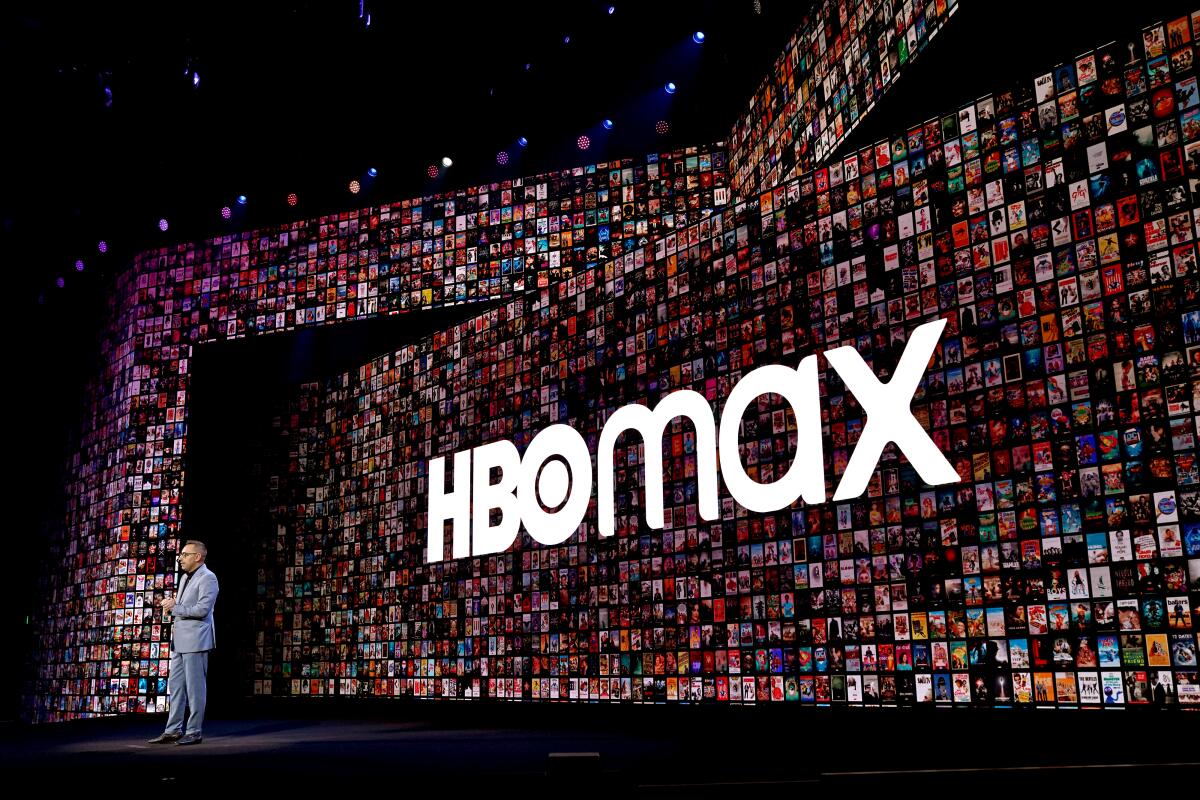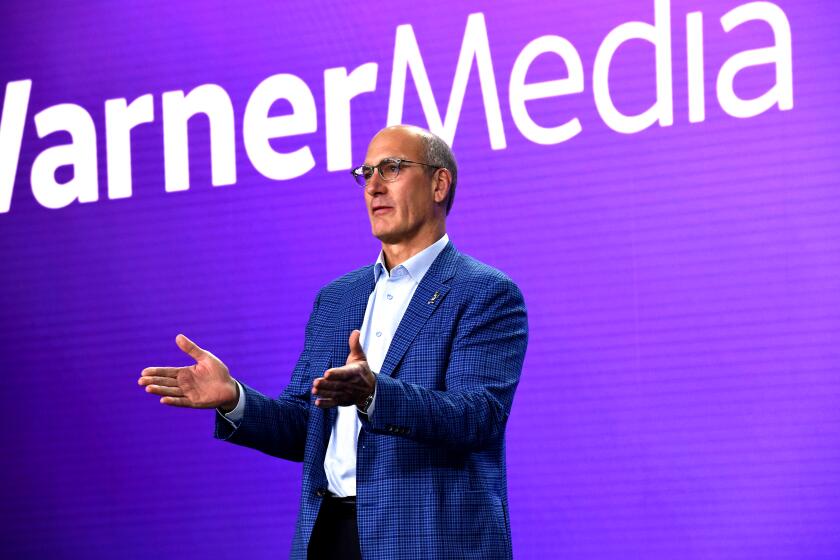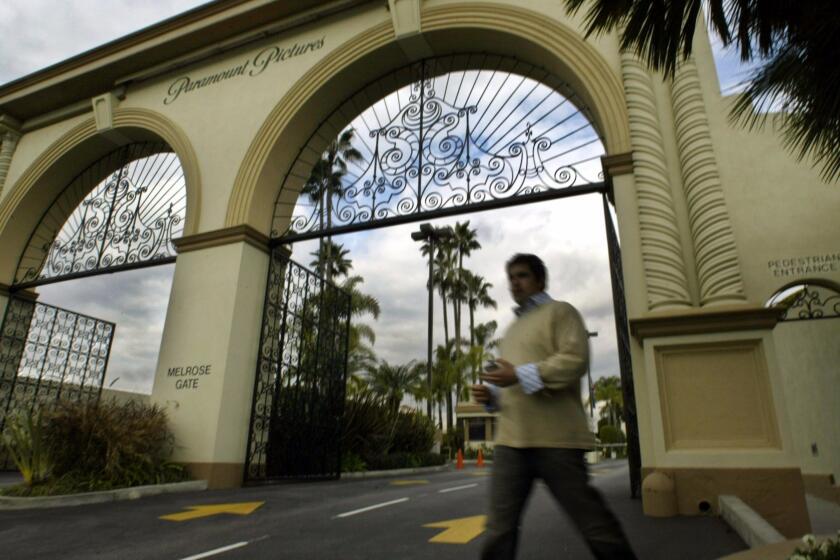AT&T’s WarnerMedia, Discovery to merge in blockbuster $43-billion deal

- Share via
AT&T’s WarnerMedia and Discovery unveiled their blockbuster $43-billion union Monday, a combination that would bring some of the biggest names in television — HBO, CNN, HGTV, Animal Planet and Food Network — and the Warner Bros. movie studio under one roof.
AT&T said it would exit the entertainment business by spinning off Warner Bros. and the TV channels that it acquired just three years ago. Those WarnerMedia assets will be combined with the Discovery channels, creating a new publicly traded company.
At launch, AT&T shareholders would own 71% and Discovery shareholders 29%. AT&T would receive $43 billion in cash, debt securities and other consideration so that it could pay down debt.
The proposed media marriage comes amid upheaval in the industry as traditional TV giants grapple with declining ratings, consumer cord-cutting and the rising threat posed by Netflix, Hulu, Disney+ and other streaming services.
The deal came together in the last three months after Discovery Chief Executive David Zaslav sent a Feb. 13 email message to AT&T Chief Executive John Stankey, grousing about lockdown restrictions that caused him to miss the AT&T Pebble Beach Pro-Am golf tournament.
The two men began talking about the future of media and eventually started meeting secretly at Zaslav’s Greenwich Village brownstone to hammer out deal terms. The boards of AT&T and Discovery approved the deal this weekend.
“It’s such a historic company and a great set of assets and it fits so well with what we’ve built over the last 15 years that I’ve been at Discovery,” Zaslav said Monday in an interview with The Times.
The name of the new entity will be announced next week.
Zaslav, 61, will run the combined company. The veteran executive has more than 30 years of experience in media, joining NBC in 1989 to build CNBC. He has been leading Discovery since 2007. A lawyer by training, he helped take the company public in 2008 and was an architect of its transformative $12-billion purchase of Food Network and HGTV in 2018.
By handing the reins to Zaslav, AT&T signaled its desire to make a clean break following a disastrous foray into entertainment. The Dallas telecommunication company’s two problem-plagued acquisitions — Time Warner and DirecTV — heaped $150 billion in debt onto its balance sheet. Three months ago, AT&T said it would unload El Segundo-based DirecTV into a new venture with TPG Capital. AT&T bought DirecTV for $49 billion in 2015 and will exit with $16 billion in cash.
The companies are expected to announce their proposed joint venture as early as Monday, creating a new company that would reshape Hollywood.
The WarnerMedia-Discovery deal is expected to close in 2022, providing more uncertainty for a weary workforce.
WarnerMedia has cut 2,000 employees in the last year. By the time the deal is finalized, the remaining workers — including thousands in the Los Angeles area — will have experienced three different ownership regimes in less than five years. In the last three years alone, there have been three different CEOs of WarnerMedia.
Jason Kilar, WarnerMedia’s chief executive for the last year, will manage the company through the transition. But it’s unlikely there would be a role for Kilar in the combined company once Zaslav takes the helm. Also unknown is the fate of other executives, but in a video conference with reporters on Monday, Zaslav praised several high-level executives, including CNN chief Jeff Zucker and Warner Bros. Entertainment Chairman Ann Sarnoff.
The proposed merger will introduce “a lot of internal stresses given the likelihood of job eliminations (particularly at WarnerMedia, which has already been through a couple rounds of upheaval since the AT&T acquisition),” Doug Creutz, a media analyst with Cowen & Co., wrote in a report.
The combination could lead to $3 billion a year in cost savings. The company will have about $55 billion in debt.
AT&T shares fell 2.6% to $31.39 after the company announced it would cut its dividend to reflect the loss of earnings from WarnerMedia. Discovery shares slid 5% to $33.85.
Analysts said the deal made sense, although some noted the challenges of melding two different corporate cultures.
“The scale certainly would be imposing,” Creutz wrote. “However ... the combination looks unwieldy, with close to 30 different cable networks owned in the U.S., plus many more owned internationally.”
If approved by investors and regulators, the combination would generate more than $50 billion a year in revenue and about $14 billion a year in earnings before interest, taxes, depreciation and amortization. It would house the DC Comics franchise, Harry Potter, “Game of Thrones,” “Cake Boss,” “100 Day Dream Home” and “Pit Bulls and Parolees.”
The spinoff move marks a significant retreat for AT&T. It announced the $85-billion purchase with fanfare in October 2016 and battled in court for more than a year with the U.S. Justice Department to win the deal’s approval. Former President Trump, a CNN critic, wanted the deal blocked. AT&T prevailed in court, and finalized the deal in June 2018.
But that merger has been a rocky ride, marked by an exodus of top executives almost from the beginning.
Now, AT&T is betting that its entertainment assets will be worth more in a stand-alone company. The telecommunications company also was eager to remove some of the nearly $170 billion in debt from its books and free up capital to build its 5G phone and fiber networks.
“AT&T’s balance sheet allowed neither the aggressive investment required for HBO Max nor the 5G wireless push,” veteran telecommunications analyst Craig Moffett wrote in a research report. “Ultimately, they had no choice. The die was cast even before the ink was dry on their initial acquisition.”
The Motion Picture Assn.’s report on 2020 shows how much the industry changed because of the COVID-19 pandemic and streaming.
Although AT&T had hoped for ways to connect its phone subscribers with its entertainment offerings, the company struggled to build a streaming service that could compete with Netflix, which spends more than $16 billion a year on content, and Disney+.
Zaslav said the combined company would spend about $20 billion a year on content.
“The new combined company [will] have a content spend that exceeds most of its industry peers,” Stankey said in the video conference.
Earlier this month, AT&T rival Verizon announced that it was selling most of its media assets, including Yahoo and AOL, for $5 billion. The telecommunications market is fiercely competitive, and T-Mobile has been making gains with its 5G phone service, challenging the two longtime leaders, Verizon and AT&T.
The WarnerMedia-Discovery deal will be subject to a regulatory review. The two companies’ TV channels draw about 30% of the cable television audience and both operate nascent streaming services with growing subscriber bases. HBO and HBO Max combined have about 44 million subscribers. The $4.99-a-month Discovery+ has about 15 million subscribers worldwide.
One year after panic on Wall Street, media stocks including ViacomCBS, Discovery and Disney are booming. Investors are bullish on companies with streaming services.
WarnerMedia also owns legacy channels HBO, CNN, TBS, TNT, Cartoon Network and Turner Classic Movies plus the Warner Bros. film and TV studio. Discovery adds HGTV, Food Network, TLC, Animal Planet, OWN and Investigation Discovery. With CNN in the fold, Discovery will have increased leverage with pay-TV distributors, analysts said.
Discovery has been growing its business internationally, particularly in Europe. It is a part owner of a streaming service in Germany.
Discovery’s chairman is John Malone, a pioneer of the pay-TV business. In 1999, he sold his cable TV business to AT&T for $55 billion, becoming AT&T’s largest investor, and wound down his stake to concentrate on his Liberty Global business.
WarnerMedia insiders are bracing for another round of reconfiguration, after three years of restructuring and cuts by AT&T. Thousands of WarnerMedia jobs were shed in the AT&T era, with much of the impact hitting movie studio Warner Bros. “I think people are freaked out,” said one former Warner Bros. executive who requested anonymity to protect relationships. Executives were taken by surprise, not learning about the deal until Sunday.
But some who work with the Burbank studio, including producers, expressed relief that AT&T’s tenure was coming to an end. The phone company had little affinity for the quirks of the film business, which depends on executives’ ability to handle the delicate egos of Hollywood directors and movie stars. Last year, Kilar angered top talent, including filmmaker Christopher Nolan, when he announced the studio would put its entire slate of 2021 movies on streaming platform HBO Max the same day they arrived in theaters.
During a video conference with reporters, Zaslav said he would look to repair frayed relationships with content creators.
“I’m going to find myself an office on the Warner Bros. lot,” he said. That’s where movies such as “Casablanca,” “Ocean’s 11” and Nolan’s “Dunkirk” and TV shows such as “Friends” and “The Big Bang Theory” were filmed.
“The new company will put storytelling, journalism and creative talent at the center of everything we do,” Zaslav said. “I’m confident that this great new company will have the strongest, deepest and most collaborative relationships with the creative community. This will be my No. 1 priority.”
Staff writer Ryan Faughnder contributed to this report.
ViacomCBS executives outlined their plans for their new streaming service, which launches March 4.
More to Read
Inside the business of entertainment
The Wide Shot brings you news, analysis and insights on everything from streaming wars to production — and what it all means for the future.
You may occasionally receive promotional content from the Los Angeles Times.













